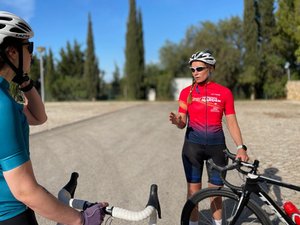How to become effective in swimming in the waves
Being able to swim in a pool is not quite the same as being able to swim in open water. In this latest article, Coach Rita explores her learning experience when she took an open water swim session with some British athletes and her surprise at the skills gap between their swimming ability and open water experience.
I have seen pro-triathletes who were very, very uncomfortable having to race in dark, cold, unknown waters.
Let’s face it. We are not aquatic animals; it takes time to feel even remotely safe when in the water, and in the back of the mind, there is always that fear of drowning and the unknown.
Training in the conditions you will race is always a good idea. It doesn’t have to be all the time: training in a track, turbo or swimming pool will obviously be more efficient and logistically easier than going on the road or ocean every day, however, you should aim to experience the great outdoors once in a while, or you can be unpleasantly surprised by how your mind will play tricks on you on race day.
But do you have access to an open water body like the one you are racing in? Is it safe? Do you have a coach or training partner to go with?
That’s when an organised group, with someone who knows the currents, and potential dangers and has the expertise to solve any issues that can arise, is an excellent option, especially when starting your triathlon journey as a beginner.
In our training camps in Portugal, we find that many athletes, mainly from the UK, have not swam in the open ocean that often (or at all). As a Portugal-based coach, it was a surprise the first time I had a session with athletes unfamiliar with the waves and sea. It is entirely normal for local athletes, even if they are not very good swimmers, to master getting in and out of rough seas with waves and currents. I quickly found out that diving under the waves to escape the white foam is not an innate skill! Even strong swimmers struggled with it!
At the training camp, the coaches make sure there is time to get comfortable with the water temperature, with the way the sand feels in your feet, to understand the backwash, how currents work, and how to spot the best places to swim (or not to swim!).
Start slowly, there is no pressure or need to hurry and always have safety as a priority:
Get used to the temperature and how the water feels around your feet and legs. Play a little bit
in the shallow waves, diving under the white foam, breathing out, and coming up on the other side of the wave,
Lie down in the water with your hands in the sand (like a crocodile!)
If comfortable, walk around with the water at the waistline and use your arms to balance and for a bit of propulsion.
Try to use small waves to body surf to the beach,
If comfortable, try to pass the white waves and go behind them, get used to how the water moves up and down and how every wave has different heights and forces.
Swim in different directions and notice how breathing and stroke are affected by the waves and wind.
Actual swim training may be secondary, and that is ok, mastering the waves may be the fundamental aim of the session.
The most important takeaway, in my opinion, is to know that even the most experienced swimmers struggle or have struggled in the past with fear of the unknown depths. So, don’t be embarrassed or feel less able than others. Ask for help and guidance. You will quickly realise you are not alone. Our camps all cater for open water beginners or those less comfortable with our coaching team, so that is a great place to start.
Have an empathetic coach by your side and you will be swimming through the waves like a dolphin in no time!

Rita is top of her class in Sports Science (Major in Triathlon Training), is a qualified Level 3 Triathlon Coach (Madrid 2016) and Level 2 Swimming Coach. She is also a Veterinary Doctor and has a deep understanding and interest in anatomy, physiology and metabolic conditioning.
Passion for the sport and enjoyment of the training process are key elements to keep you motivated and are the focus of Rita’s coaching.
Visit Rita's
Coach profile
We’re here to help
Tri Training Harder are one of the leading Triathlon coaching providers in the UK, using our wealth of experience to unite scientific and technological research with already well-established and successful best practices, to create a formula for triathlon and endurance coaching that works.
The result is an honest, dynamic, yet simple new way of constructing an athlete’s training to allow them to reach their potential.
If you’re planning your next season, just starting out in the sport or are looking for extra guidance at the very top end of the field, we are here to help, and our coaches would be delighted to hear from you. You can contact us via the website, and one of the team will be in touch.

